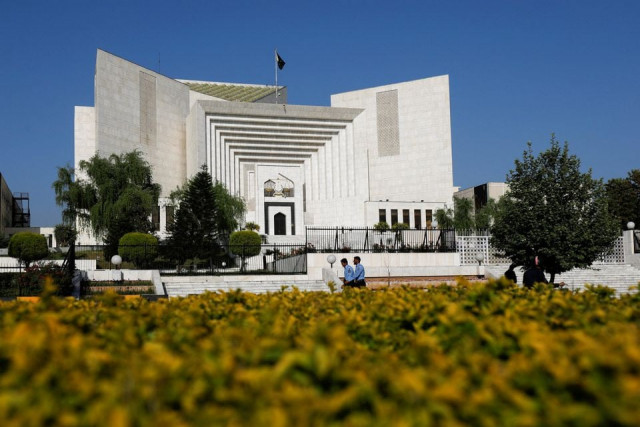Article 224 can’t be held in abeyance: SC
Says as courts as Guardian of Constitution cannot stay silent over its violation

The apex court has asked the Election Commission of Pakistan (ECP) as to how long a constitutional provision—Article 224—can be held in abeyance, noting that courts being the “Guardian of the Constitution” cannot keep quiet over this violation of the Constitution forever.
“Negative forces become active when elections are delayed. How long can the courts—which are Guardian of the Constitution—stay silent [over this violation]?
“How long can we put Article 224 into cold storage?” asked Chief Justice of Pakistan (CJP) Umar Ata Bandial on Thursday while leading a three-judge bench.
The bench, also comprising Justice Munib Akhtar and Justice Ijazul Ahsan, was hearing a review petition filed by the ECP against the bench’s April 4 order for holding polls for the Punjab Assembly on May 14.
Article 224 unequivocally states that elections for a legislature—dissolved before completion of its five-year term—must be held within 90 days after its dissolution.
On Thursday, when ECP’s Counsel Sajeel Swati resumed his arguments in support of enlarging the scope of the review petition, the bench asked him to stay focused.
“You are all over the place. Kindly stay focused,” Justice Bandial interrupted Swati. “The arguments should be comprehensive and concise. We have been hearing your arguments for three days. We have already wasted much time discussing verdicts of the Indian Supreme Court. Tell us what your actual point is?”
While reiterating his contention that there were precedents of the apex court enlarging the scope of a review petition, Swati argued that in case of dissolution of a provincial assembly before its term, a caretaker government could work until all the other legislatures complete their five-year term.
“What if a provincial legislature is dissolved six months after its formation? Will a caretaker government in that case stay in power for the next four and a half years?” Justice Ahsan asked the counsel.
The counsel maintained that the caretaker government will work for four and a half years in that case. “We cannot violate one provision of the Constitution in order to implement another provision. Article 254 can provide justification for delaying elections,” he said.
Article 254 says: “When any act or thing is required by the Constitution to be done within a particular period and it is not done within that period, the doing of the act or thing shall not be invalid or otherwise ineffective by reason only that it was not done within that period.”
Read Imran moves SC against 'undeclared martial law'
Justice Bandial asked how the Constitution can allow a situation in which an elected government stays in power for six months but a caretaker government stays in power for four and a half years.
Justice Ahsan said the 90-day time limit is also stipulated in the Constitution. “The purpose of a caretaker government is to help in conducting elections in 90 days.
“Where is it written that the term of a caretaker government can be increased? Increase in the term of a caretaker government is against the spirit of the Constitution."
While agreeing to the court’s observations, the ECP counsel said the poll supervisory authority had announced holding polls in Punjab on October 8 in view of ground realities.
On the order of the apex court, the ECP on March 3 announced holding polls in Punjab on April 30. However, on March 23, the polls supervisor issued another notification, announcing deferring the polls till October 8 while citing a deteriorating security situation in the country.
However, the three-judge bench on April 4 set aside the notification, ordering the ECP to hold polls in the province on May 14. This order sparked an angry reaction from the parliament which later rejected a government bill seeking funds for holding polls in the two provinces.
The ECP later also filed a review petition against the April 4 order.
Responding to Swati’s claim, Justice Akhter asked what will happen if the ECP on September 8 once again announces that holding elections on October 8 is now not possible.
“The ECP may keep repeating the same phrase for the next two years [and keep deferring the polls]. Holding elections is the duty of the ECP not its discretion,” the judge said.
Justice Bandial said earlier that ECP only cited lack of resources as a reason for delaying polls. “When will the ECP say: enough is enough, we are holding elections?” he asked.
Giving an example of Balochistan, the CJP said despite security concerns people took part in the last local government polls in the province and the turnout remained 60%. The court later adjourned till May 29.



















COMMENTS
Comments are moderated and generally will be posted if they are on-topic and not abusive.
For more information, please see our Comments FAQ